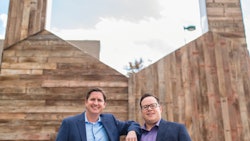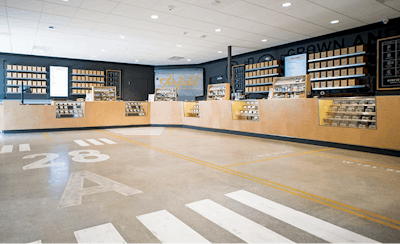
Dispensaries make dozens of decisions daily that can affect the health of their businesses— including their bottom line. Some admittedly work out better than others. Cannabis Dispensary spoke with six owners and managers to find out the best business decisions they’ve made and the lessons they’ve learned since opening their dispensaries. Here’s what they had to say.
1. Marc Matulich, founder and owner, Airfield Supply Co.
Best Business Decision: Rebranding for an ever-changing cannabis market.
Airfield Supply Co. may not exactly sound like a cannabis dispensary’s name, but when it opened in 2009, its name rang even less true: It was dubbed South Bay Healing Center. At that time, cannabis sales in California were “still a very gray area,” Marc Matulich says.
“Industry attorneys advised that the name of a dispensary should be innocuous, so that it did not draw unwanted attention,” he says. A name like South Bay Healing Center would ensure that patients knew what was inside, but residents walking by the building would remain happily naive, Matulich reasoned. “That strategy worked very well for us at the time,” he says now, but, “in a few short years, dispensaries transformed from low-profile shops to marketing machines.” Matulich realized South Bay Healing Center needed a new name in order to attract new business and dedicated customers.
“In September 2015, we relocated the dispensary,” Matulich says, “and opened our doors under the new name: Airfield Supply Co. The concept of Airfield Supply Co. was inspired by our new location, [which was] next door to the San Jose Airport.” The new business name didn’t scream cannabis either, but, “when thinking about the concept, there were so many abstract connections between cannabis, flight and travel,” Matulich explains. “Aircrafts transport passengers high into the sky to their destination of choice, and it is Airfield’s goal to help all patients comfortably arrive at their destination: wellness. Airfield Supply Co. is a blend of the best of cannabis culture and a lifestyle celebration of the golden era of aviation. We believe that ‘High is a Place,’ and Airfield [Supply Co.] exists to take you there. Our brand has a unique feel that stands out in a field of green crosses and purple pot leaves.”
Lesson Learned: Stay true to your roots.
Even with a snazzy new name and refined storefront, “We are still the same team of people striving to provide the highest grade of cannabis to our customers,” says Matulich. That was comforting to many of their customers, who knew the brand as South Bay Healing Center and worried its new name would mean a change in quality or customer service. “It was important we maintain the grassroots, family culture on which South Bay Healing Center succeeded,” Matulich says. “South Bay Healing Center was successful because we provided top-notch products with excellent customer service. Treating our customers with respect and compassion has always been a core value with our team. And while Airfield Supply Co. is much busier, we still strive to personally connect with all our patients and provide the same top-quality product and service that has made us successful from day one.”
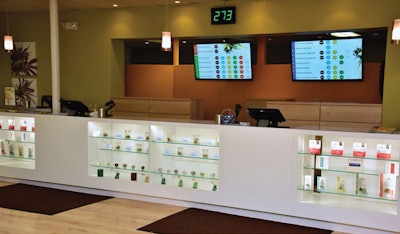
2. Patricia Rosi, owner, Wellness Connection
Best Business Decision: Investing in the future—not the present.
When Wellness Connection opened in 2011, it didn’t need a sophisticated tracking system or thousands of square feet. But Patricia Rosi wasn’t thinking about the company’s current needs—she was looking to what was ahead. “From the get-go, we always believed in investing in building the infrastructure of the company’s future,” Rosi says. “We focused on the long term—we thought about what we would need in the future, rather than thinking about opening tomorrow.” That’s only one reason why the company “invested very early on into tracking software” before other big names in the business had caught on, Rosi says, and purchased properties that far out-sized their current customer base. “Granted, we’re in Maine,” Rosi laughs, “so maybe real estate is cheaper here than in California. But we always had to keep the idea of scaling up in mind in every single thing we decided to do.”
Lesson Learned: Think about business, not just cannabis business.
In any industry—including cannabis—a business may want to stand out from the crowd. But in Wellness Connection’s case, what’s worked is treating the cannabis business like any other business. “We have really focused on not creating a one-of-a-kind model just because it’s cannabis,” says Rosi. Instead, Wellness Connection has asked itself several business questions, including: “What makes a sound company?” says Rosi. “What is our mission? What drives our employees? What gives us the ability to secure great talent, and make sure those employees are engaged and fun? For me, planning for the future just reinforced the fact a good cannabis business is like any other good business in general.”

3. Paul Pedreira, owner, Portland Best Buds
Best Business Decision: Setting up like any other store.
When medicinal cannabis was legalized in Oregon, dispensaries had to follow certain security protocols: Customers were required to first enter a check-in room, where they would present their ID and medical card, before they were allowed admittance into the store itself to shop. It wasn’t exactly the most welcoming process, says Paul Pedreira. “It was all very sketchy looking and not like a normal store,” he describes. So when Oregon welcomed recreational marijuana, Pedreira quickly changed his store to make it look like any other boutique. Customers could peek inside store windows before walking right in the front door—and never had to present a license or other ID until the point of sale, a move he thinks many other dispensaries aren’t yet making. “I think [the change has] improved our business, but it’s also done exactly what I want to do, which is normalize this process and be in the light and be open, and not be so sketchy and shady,” Pedreira says. “We prefer to keep it open and friendly and inviting to the public—and that feeling and environment really helped us.”
Lesson Learned: Break free from the crowd.
Pedreira’s best advice? “Dont be afraid when everyone is zigging to zag.” Pedreira believes shops that are doing well “are the ones that differentiate themselves from other shops,” he says. For example, “we provide other services and events that other shops aren’t doing. Most shops are beginning to look like upscale, almost Apple-store like, but we have more of a down-to-earth vibe—we just don’t feel like it’s helpful to just follow the herd,” he says. Portland Best Buds hosts a gallery event each month, showcasing a different artist’s work in the dispensary. “We want to be a part of the community—we don’t want to just be a cannabis shop,” Pedreira explains. “These events have really helped our business and helped us meet people in the community, and become more of a pillar of the community we’re in. It’s paid off to be bold in our decision making and not just copy every other shop.”
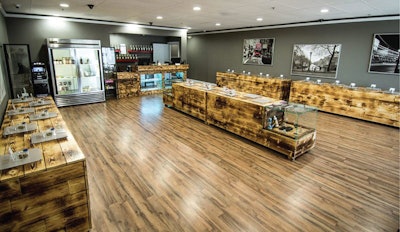
4. Ryan Walker, co-owner, Cannabis Nation Seaside
Best Business Decision: Don’t put yourself in debt to open.
Cannabis Nation Seaside’s owners had an advantage before they started their business: They owned a construction company, so they didn’t have to hire carpenters and designers to build their shops. But the owners did more than put in a lot of sweat equity into their dispensary: “We sold our houses, and we put everything we had into believing in this industry, and we’re growing faster than we can keep up with at this point,” says Ryan Walker. “We own 100 percent of this thing.”
Now, Cannabis Nation Seaside is ready to expand from three dispensaries to five by the end of the year, Walker says, but the owners won’t be doing the hard labor this time. Because they didn’t take on debt to open, they can afford to hire out for the work. “We did what we know how to do and tried to copy that business model in this [dispensary],” he says. “I know a lot of people think it’s about selling drugs, but it’s a business—and if you go into it looking at it like a business and treating it like a business, you can be successful. You see people coming into it thinking they’re going to be rich, and that’s all they see. But it’s not as easy as that—that’s for sure.”
Lesson Learned: Give your business your all.
You’ve heard this before, and Walker is here to repeat it again: “What you put into it [your business], you will get out of it,” he reminds all business owners. “We have definitely put everything on the line to be successful, and it wasn’t always easy. It still isn’t easy. We still have our struggles. But I really believe we’re one of the top dispensaries in Oregon.” As of now, each location has the potential to see 700-800 customers a day, Walker says. “There’s no one who can really compare with our business model and how we do business, and the way we treat our customers,” Walker says.
5. Benton Hutcheson, general manager, River Valley Remedies*
Best Business Decision: Expanding your mission beyond selling cannabis.
Benton Hutcheson left his East Coast home to help River Valley Remedies' owner get the business off the ground. The dispensary has been open for just five months, but Hutcheson has quickly learned that one of the best business decisions the shop has made is to invest in helping people and not to focus exclusively on cannabis. “We are much more than a dispensary,” Hutcheson says. “We consider ourselves a dispensary and an herbal apothecary.” That means, in addition to cannabis, the dispensary also sells medicated and non-medicated products “so that our customers can come in and find some relief from pain, from whatever that ails them,” Hutcheson says. “Some people can’t sleep at night, some people have high anxiety and stress—and they’re trying to get themselves off of medication. I’m constantly looking to find products where people can come in and use them, and not get stoned, because there are plenty of people who come in and that’s exactly what they’re looking for.” Hutcheson continues, “I tell every customer that everyone is different and has different needs. It comes down to the openness to try. It’s about the space to allow it to work without judgment. And moving forward with that state of mind has allowed us to be an open establishment that is more than just a dispensary.”
Lesson Learned: Make knowledge part of your business.
According to Hutcheson, it’s a dispensary’s job to know about more than just the cannabis they’re selling—it also needs to know how to help people. “We’ve all had marijuana as part of our lives, but I’m a new general manager, and most of our budtenders are new budtenders, and we are realizing it’s our responsibility to pass down knowledge, and research [for] ourselves and form our own opinions and gather as much information as we can to help these consumers who come in,” Hutcheson says. “A lot of the time, [our customers] are much older than us, and we’re having to give them knowledge in an area that they have no clue about. Some people have a stigma they have to get past, and it’s our job and our responsibility to be prepared with information and knowledge to assist them in any way possible. It’s about realizing there is a big responsibility on our shoulders.”
*Editor's note: Hutcheson is no longer with the company.
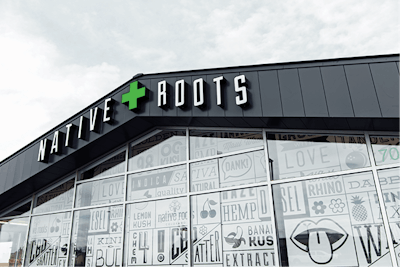
6. Ryan Brown, CEO, Native Roots Dispensary
Best Business Decision: Growing across Colorado before looking to other states.
Colorado was one of the first states—along with Washington—to legalize cannabis for recreational use. But Native Roots Dispensary didn’t look to Washington—or any other states that soon followed—to grow its business footprint. Instead, the dispensary stuck to Colorado, says Ryan Brown.
“This has proven to be a wise decision, as we’ve been able to learn from a diverse set of customers and patients how cannabis intersects with their life and how Native Roots can be there to provide the most welcoming, meaningful and unique experience in the cannabis landscape,” Brown says. “Focusing on Colorado has also allowed us to build and mature a strong leadership and operational team—from which we can [one day] grow aggressively on a national level, should we choose to do so.”
Lesson Learned: Not all things are equal.
“We’ve learned that not all markets, customers and patients can be treated equally,” Brown says. “What works in one part of the state doesn’t necessarily work in another. The state of Colorado has a diverse demographic, and the needs of consumers and patients are different depending on what part of the state you’re in. These learnings have helped us refine what our brand stands for, while learning how to support the needs of a diverse customer base in both our product offerings and customer and patient experience.” In other words, a one-size-fits-all approach won’t work for dispensaries in Colorado, Brown warns. “We have the structures and processes in place to be able to accumulate that local wisdom and translate it into business decisions at the store or regional level that don’t conflict with what a brand stands for,” he says. “We have a strong brand identity, we know who we are, and our model is to support our customers and patients where they are.”










